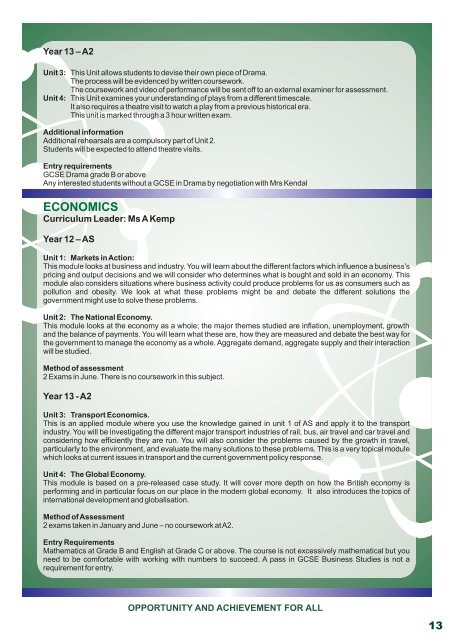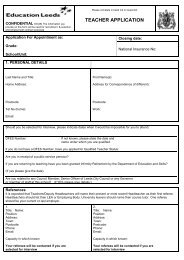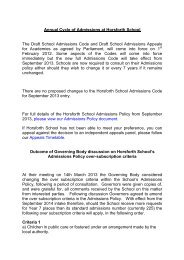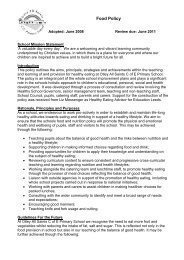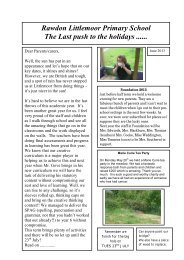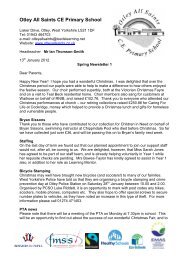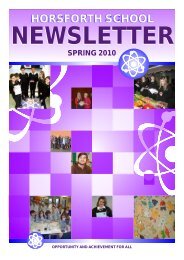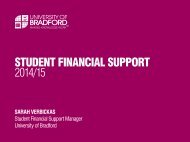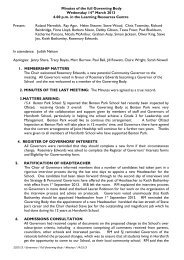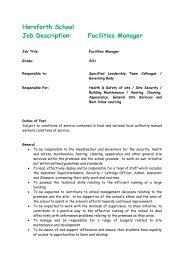POST-16 PROSPECTUS UPDATE SEP 11.cdr
POST-16 PROSPECTUS UPDATE SEP 11.cdr
POST-16 PROSPECTUS UPDATE SEP 11.cdr
You also want an ePaper? Increase the reach of your titles
YUMPU automatically turns print PDFs into web optimized ePapers that Google loves.
Year 13 – A2<br />
Unit 3: This Unit allows students to devise their own piece of Drama.<br />
The process will be evidenced by written coursework.<br />
The coursework and video of performance will be sent off to an external examiner for assessment.<br />
Unit 4: This Unit examines your understanding of plays from a different timescale.<br />
It also requires a theatre visit to watch a play from a previous historical era.<br />
This unit is marked through a 3 hour written exam.<br />
Additional information<br />
Additional rehearsals are a compulsory part of Unit 2.<br />
Students will be expected to attend theatre visits.<br />
Entry requirements<br />
GCSE Drama grade B or above<br />
Any interested students without a GCSE in Drama by negotiation with Mrs Kendal<br />
ECONOMICS<br />
Curriculum Leader: Ms A Kemp<br />
Year 12 – AS<br />
Unit 1: Markets in Action:<br />
This module looks at business and industry. You will learn about the different factors which influence a business's<br />
pricing and output decisions and we will consider who determines what is bought and sold in an economy. This<br />
module also considers situations where business activity could produce problems for us as consumers such as<br />
pollution and obesity. We look at what these problems might be and debate the different solutions the<br />
government might use to solve these problems.<br />
Unit 2: The National Economy.<br />
This module looks at the economy as a whole; the major themes studied are inflation, unemployment, growth<br />
and the balance of payments. You will learn what these are, how they are measured and debate the best way for<br />
the government to manage the economy as a whole. Aggregate demand, aggregate supply and their interaction<br />
will be studied.<br />
Method of assessment<br />
2 Exams in June. There is no coursework in this subject.<br />
Year 13 - A2<br />
Unit 3: Transport Economics.<br />
This is an applied module where you use the knowledge gained in unit 1 of AS and apply it to the transport<br />
industry. You will be investigating the different major transport industries of rail, bus, air travel and car travel and<br />
considering how efficiently they are run. You will also consider the problems caused by the growth in travel,<br />
particularly to the environment, and evaluate the many solutions to these problems. This is a very topical module<br />
which looks at current issues in transport and the current government policy response.<br />
Unit 4: The Global Economy.<br />
This module is based on a pre-released case study. It will cover more depth on how the British economy is<br />
performing and in particular focus on our place in the modern global economy. It also introduces the topics of<br />
international development and globalisation.<br />
Method of Assessment<br />
2 exams taken in January and June – no coursework at A2.<br />
Entry Requirements<br />
Mathematics at Grade B and English at Grade C or above. The course is not excessively mathematical but you<br />
need to be comfortable with working with numbers to succeed. A pass in GCSE Business Studies is not a<br />
requirement for entry.<br />
OPPORTUNITY AND ACHIEVEMENT FOR ALL<br />
13


